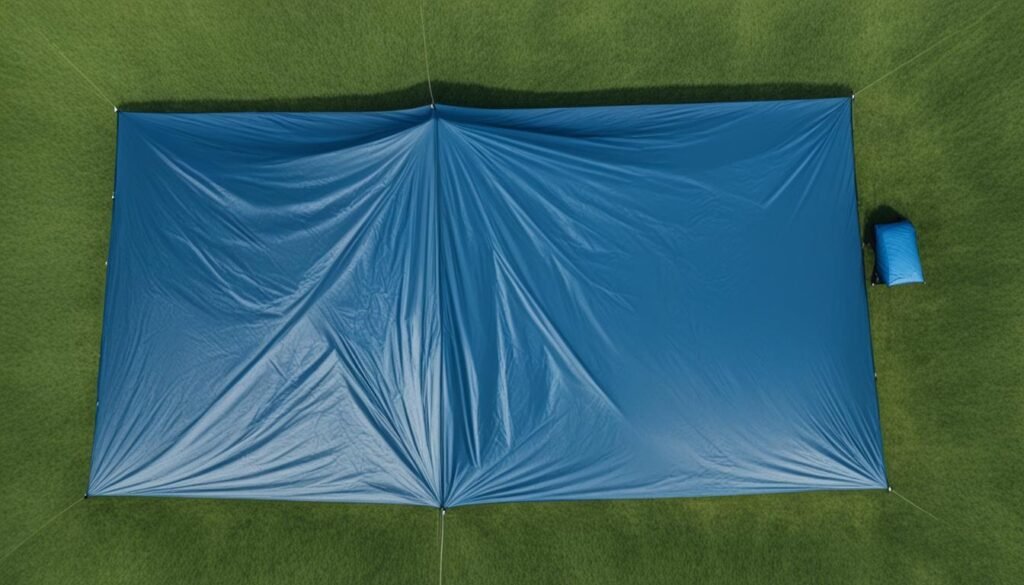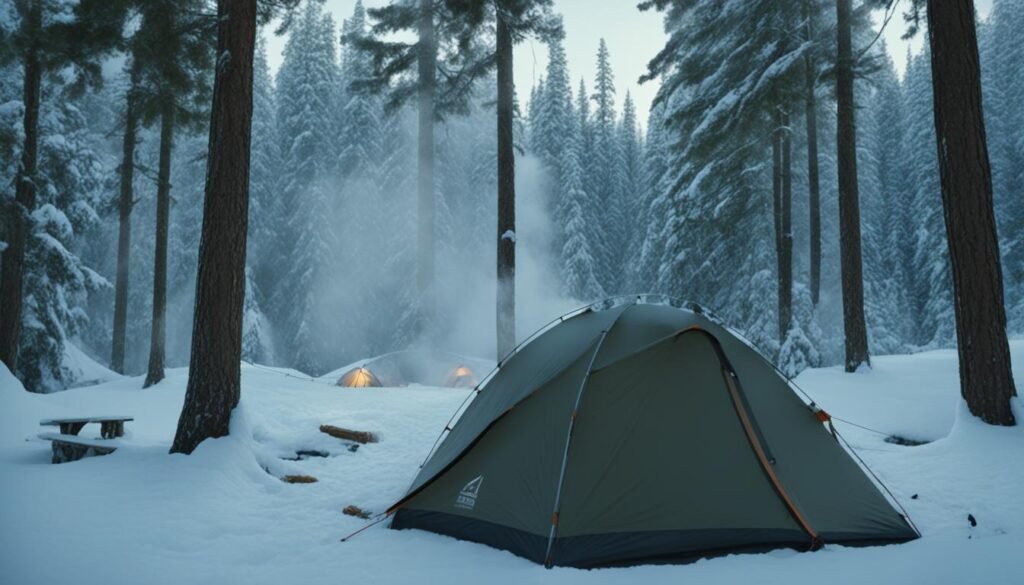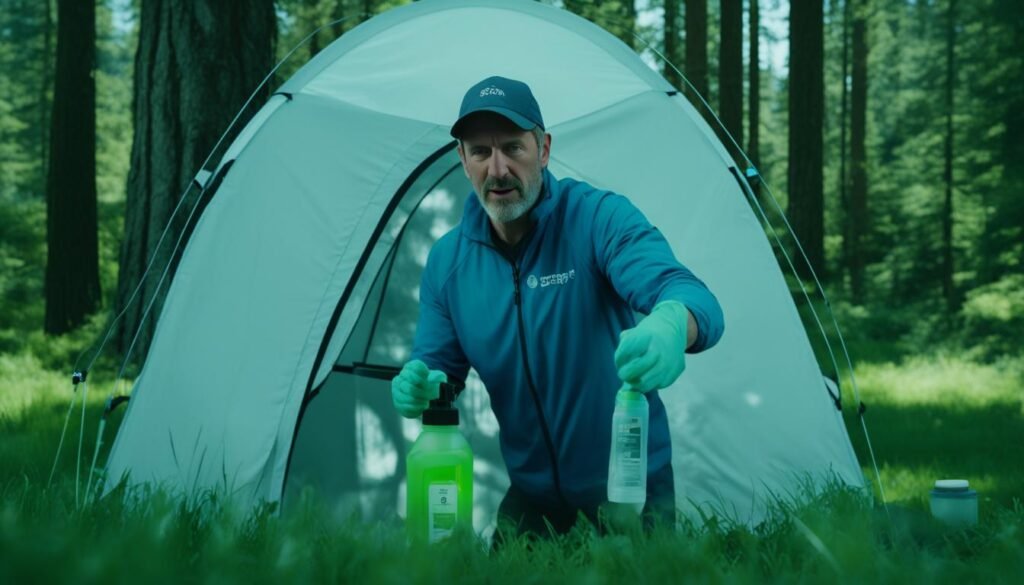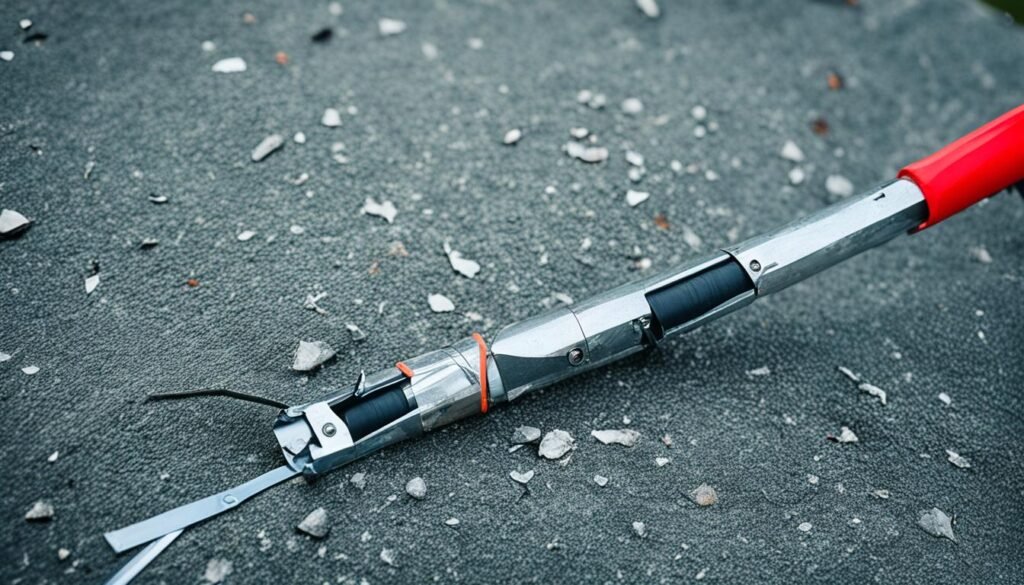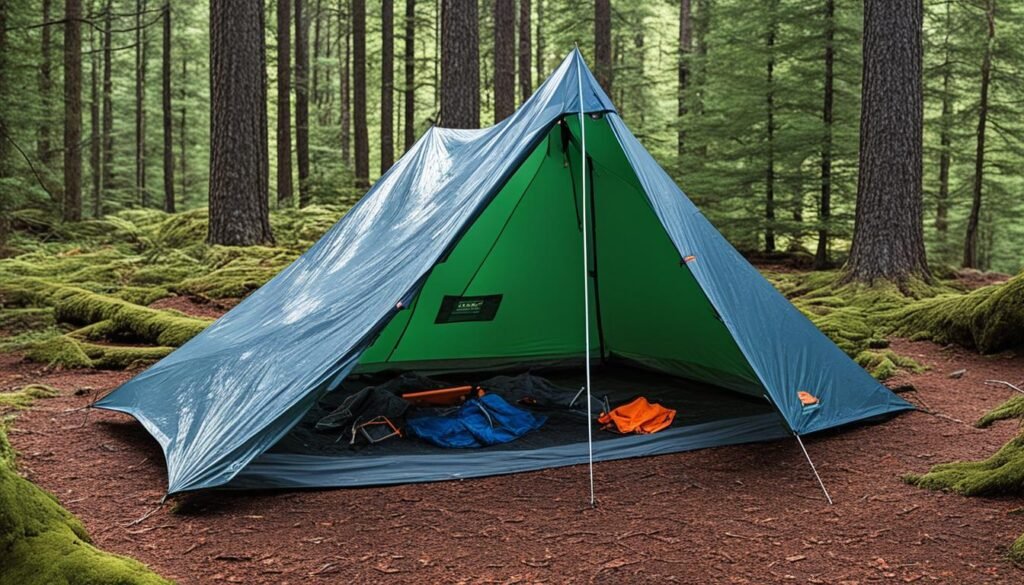Keeping your tent safe is key, especially for those camping alone. While attacks from animals are uncommon, they sometimes happen. This makes using preventative camping measures crucial. Setting up a space around your tent with wire or string that has bells can warn you early. It helps to know though, strong winds might set these alarms off by mistake.
Some campers choose to bring a gun for extra safety. However, many more look to solve issues without violence. This approach makes sure camping stays peaceful. Although, danger from bad people is not common, being prepared brings a sense of security. It allows for a night’s rest knowing you’ve done what you can to be safe. With this, your time in nature becomes not just safer but also more fun.
Why You Need a Secure Perimeter While Camping
It’s key to set up a snug border while camping for camping safety. A safe area helps detect threats early and gives peace at night. Camps can be in danger from wildlife and strangers. Using the right security can keep them away.
For better outdoor security, tools like Camp Alert Perimeter Security System are great. This tool has a loud 135-decibel alarm and a trip rod to activate it. It warns you of dangers and also has lights for signaling.
A safe camp lowers wildlife encounters. The CAPSS3 is easy to carry and put up. Place them around your site with the invisible tripwires. This makes a strong safety net.
- Try Brite-Strike’s green or red APALS for long glowing. They last for 12 hours without charging, saving money.
- Using both simple and complex tools like the Old Tin-Can Trick and Modified Alarms can make your spot safer.
These methods help with camping safety and keep you safe from people and animals. Learn about the area before going. A well-protected spot lets you enjoy nature without fear.
Understanding Potential Threats at Your Campsite
Camping is exciting, but it has risks like campsite threats. These include animal encounters from raccoons to bears. To be safe, keep food in bear-resistant containers or high up.
Security risks while camping can also come from people. Always be alert and use security features like gates and cameras. Remember what Harry Connick Jr. said: “Safety’s just danger, out of place.” This means being ready is the best way to stay safe.
Remember to keep campfires at least 15 feet from tents and trees. This stops wildfires. Campers not careful with fire safety can cause big problems. Make sure fires are fully out before leaving.
Putting your tent on level ground is very important. It helps avoid accidents, especially when it’s windy. Each state has its own safety rules for camping. They include choosing safe tent spots and treating nature well.
Choose your campsite wisely. Stay away from water, dead trees, and bug homes. Watch out for poisonous plants too. A good roasting stick should be about 30 inches long. This keeps you safe from the fire.
Many new RVs have security systems. This helps with safety. Whether you’re in a tent or an RV, following safety tips is vital. It protects you from various dangers during your outdoor adventure.
Choosing the Right Campsite for Security
Choosing the right campsite is key for safety and ease. Look for sites with natural defenses like rocks and trees. These can protect you from wild animals and unwanted people.
Be sure your campsite has cell phone service for safety. Also, it should be near water for drinking and emergencies. Knowing the area around the camp is important too.
It’s smart to be close to where you get food. This reduces the risk of dangers while searching for food. But, don’t pick spots with too many people as it could bring trouble.
Always prepare for camping defensively. This means traveling with pets or a weapon for protection. For example, taking a gun along a usual route means you’re safe but without any threat. Plus, being friendly to noisy neighbors can increase your safety by working together.
A good campsite has nature’s protective barriers and necessary facilities. This ensures a safe and enjoyable time camping.
Setting Up a Physical Barrier
Physical barriers are a smart way to keep your campsite safe. You can use things like a simple alarm system. It’s made from common items like aluminum cans, paracord or fishing line, and trees nearby.
First, find two trees close together. Hang the cans in the space between them. They’ll make noise if something moves them. This will warn you about anything coming near your campsite.
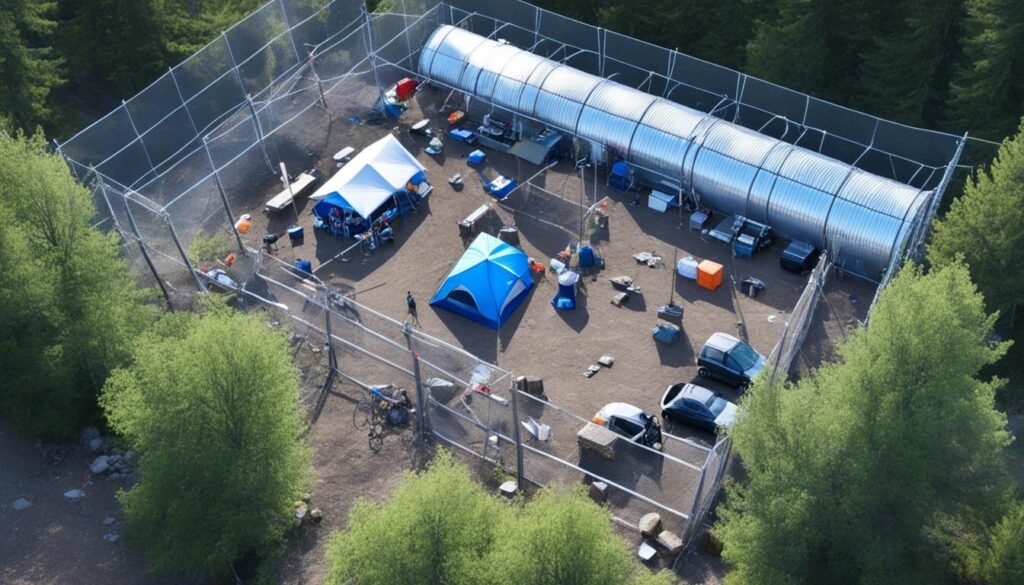
But, you need to check this alarm often to make sure it works. It’s good for keeping big animals, like bears, away from your tent. This adds another layer of protection for you.
Also, use mosquito nets for extra safety. These let air through but stop bugs. By using these tips, you can have a peaceful, safe time outdoors.
Low-Tech Perimeter Alarms
Low-tech perimeter alarms are great for better campsite security. You can make them yourself with things like cans, fishing line, and sticks. These easy-to-make alarms work well, even without electricity. So, your camp stays safe, no matter what.
Here is what you need for a simple alarm:
- Empty aluminum cans
- Fishing line or paracord
- 3 thin sticks
- Small pebbles
Start by filling the cans with pebbles. This makes them noisy. Then, tie the cans with the fishing line. Attach the other end to trees or something stable around your camp. Make sure the cans hang close to the ground. This way, they make a loud noise once the alarm is set off.
For the trigger, you will use the 3 sticks. One stick should be as long as your arm. Another as long as your finger. And the last one is a middle-sized stick. Use them to make a lever system. This will make your alarm more spot-on and reliable.
Also, think about hiding your alarms by painting the cans or covering them with mud. This trick is great for keeping animals away. They usually see in black and white, so they might not notice your alarms.
Use trip wires for other alarm options. You can use fishing line or electrical wire. This comes in handy for camping or if there’s unrest. Using trip wires for safety is both old and new. It comes from how people set up alarms in war, to now being part of our homes.
Whether it’s your home or a camp, simple alarms work really well. They help keep you safe without needing power or expensive stuff. With simple steps and materials, you can make a secure alarm system. Always ready to warn you of dangers.
Modern Security Gadgets for Campers
Camping is more popular than ever. Campers now value safety a lot. This has made reliable camping security tech very important. These advanced devices help make the camping area safe.
The Camp Alert Perimeter Security System (CAPSS) is an amazing safety gadget. It has a 135dB alarm and bright LEDs. These are set off by a tripped line. It warns campers of unwanted visitors.
Harbor Freight’s alarms are also great for keeping an eye on your stuff. They sound loud sirens when they feel vibrations. This gives a quick warning against possible dangers.
- The ABC Security System is great for big RV parks. It has outdoor cameras that notice motion and send alerts.
- DEF’s system has top-notch sensors and cameras for clear night images.
- The GHI system has a powerful alarm and can be set up to alert you in different ways based on your needs.
- The JKL system is easy to use and has the latest in monitoring and license plate recognition.
- MNO brings in new tech like thermal cameras and drones for even more security.
Different high-tech campground security systems offer various features. These include alarms, lights, and cameras. But, all systems have alarms to let campers know when something’s wrong.
Using these new security tools can make your camping trip safer and more fun. They ensure you can relax and enjoy the outdoors with peace of mind.
How to Create a Secure Perimeter Around Your Tent
Setting boundaries around your camping area is key for safety and keeping your tent in good shape. Ensuring your tent is safe and well protected cuts down on possible risks. Here’s how you can make your camping area secure:
- Using Footprints or Ground Tarps: Place a tarp or footprint under your tent. This stops abrasion and cuts down on moisture getting to the tent floor.
- Elevate Your Tent: Put your tent on something high, like a wooden deck, to avoid damage from the ground. This also helps with moisture.
- Doormats: Keep the tent clean by putting doormats outside. It stops dirt from damaging the floor.
- Shoe-Free Zone: Decide where shoes can and cannot be worn. Not wearing shoes inside prevents floor damage.
- Floor Liners: Use floor liners to defend against pet accidents or spills. They protect the tent floor.
- Fly Sheets: Hang a fly sheet above the tent to keep it dry in the rain. It helps the tent last longer.
- Trench Digging: Make small trenches around your tent to lead water away. This stops water from the ground coming in.
- Proper Ventilation: Keep the tent well-aired to avoid dampness and keep a good temperature. It saves your tent’s condition.
- Furniture Pads: Soft pads under furniture help protect the tent floor. They lessen damage.
- Correct Tent Storage: Store your tent well to prevent mold. Proper care and storage mean your tent will last longer.
- Tarp Setup: Place a tarp that’s twice as big as your tent’s area to enhance protection. This is key for keeping your area safe.
These measures will keep your tent safe and your camping experience enjoyable. They will help protect you from bad weather, nature, and damage. Making these steps part of your camping plans is essential for a great time outdoors.
The Role of Light in Camp Security
Light keeps camps safe at night. It makes things easier to see, which is important. Putting lights in the right spots can stop bad things from happening. A study found that 75% of accidents at glamping sites could have been stopped with better lighting.
Deterrent lighting can keep trouble away. The National Fire Protection Association (NFPA) found over 2,500 fires in camping areas from 2013-2017. By using bright lights or flashing lights, you can make your camp less inviting to unwanted guests.
Here are some lighting choices to make your camp safer:
- Energizer LED Safety Flasher – Grabs attention and signals to other campers subtly.
- Combat LED lights with 100 lumens – They can stun possible threats and light up a big area.
- The Camp Alert Perimeter Security System (CAPSS) – For around $35, it adds another layer of security.
Using the right camping illumination can lower risks at glamping sites. This ensures everyone has fun and stays safe outdoors. Always be aware and use lights to protect your camp area.
Using Dogs as a Security Measure
Dogs are awesome protectors. They notice new sounds and smells way before we do. This makes them great for watching over your campsite. Just their being there makes bad guys think twice.
To make your dog even better at keeping watch, invest in a portable fence. Brands like BestPet, Yaheetech, and IRIS USA have strong, easy fences. Choose a metal fence for long use or a plastic one for lightness. Either do well for different dog sizes and types.
It’s good to give small and medium dogs at least 30 square feet to play in. Fences made of powder-coated steel stay strong through rain and sun. This keeps them from getting rusty or worn out easily.
But it’s not just about the fence. Dogs help sense when someone comes close. They can warn you of any danger. If you add a Camp Guard to help, you have a top-notch security system. This high tech tool lets you know if anyone is getting too close, making your camping trip safer.
Establishing a Safety Radius
Creating a campsite safety zone means marking defining camping boundaries clearly. Start with a perimeter of 40 to 60 yards from your camp’s center. This area should be seen as a first line of defense against any threat. Any signs of danger here demand quick and serious action.
To protect your camp, use proactive perimeter strategies. You can set up a line of fishing wire around your area. Attach noisy items like cans or a spin-cast reel to the line. These will make a sound if someone or something crosses the line. It’s a smart and easy way to boost your camp’s security on a low budget.
Also, be smart about where you pitch your tents. Keep them far from fire sources like fireworks and grills to prevent accidents. Remember, tents sometimes need their walls down in the wind. Make sure to use strong, vertical stakes for this. But if the ground is too hard for stakes, consider a Tent Ballasting System. It’s a good backup to keep your tent in place.
By using these proactive perimeter strategies, you make your campsite safer. Enjoy your time in the outdoors worry-free with these simple steps.
Utilizing Technology: Trail Cameras
Trail cameras help keep campsites safe by snapping photos or shooting videos. They work by sensing motion, which is perfect for when you’re away. This means you can watch over the camp from afar, even in the wild, for a long time without touching them.
It’s key to pick the right camera for watching wild critters. Think about how often the camera will snap, which direction it points, and how it’s placed. These choices help get sharp pictures or clips, letting you keep an eye on your spot well.
Trail cameras are now super important because camp thefts and dangers are up. People lose a lot in thefts each year and some get hurt by thieves. These cameras can scare off bad guys, keeping your stuff and yourself safe.
Adding these cameras to your gear, along with other cool safety devices, makes camping even better. Gadgets like GPS devices, satellite messengers, and drones up safety and fun. Also, things like health monitors, water purifiers, and solar chargers make outdoor life safer and easier too.
With more hikers getting lost, as Yosemite reports, remote camp watching is comforting. Trail cameras make you feel secure, scaring away unwanted visitors. They help make your camping trip a safer and nicer adventure.
Creating the Illusion of an Occupied Campsite
Making it look like people are at your camp helps stop thieves. You can make it seem like the camp is full of people using simple tricks. This can make thieves think twice before stealing.
- Set up extra chairs around the campfire to create the illusion of a larger group.
- Place a decoy tent alongside your actual tent to give the appearance of multiple families camping together.
- Scatter personal items, such as clothing or equipment, around the area to further reinforce this impression.
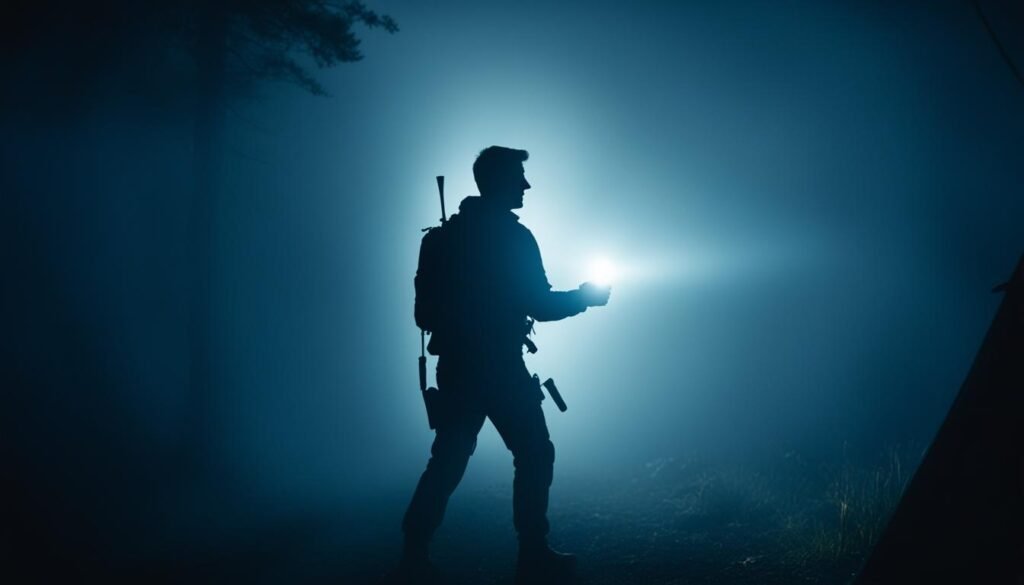
To lower the chances of theft, use these tricks. Add security gadgets like the Camp Alert Perimeter Security System (CAPSS) from Brite-Strike Technologies. This $40 system gives a loud alarm, a red light, blue flashing lights, and more. It also has a trip wire and sticky lights.
Buy door alarms and vibration alarms for $4 each. They keep your vehicles and equipment safe. Using these tricks and gadgets together can keep intruders away.
Storing Food and Waste Properly
It’s key to store food well and get rid of waste right to keep the camp clean. Also, this helps keep wild animals away. Did you know bears smell way better than us, about 2,100 times more? That’s why they love finding food and any leftover traces. So, it’s super important to keep your campsite tidy.
- Always hang food bags high, at least 10 feet up and 4 feet from tree trunks.
- Use bear-proof containers like YETI coolers for storing food.
- Get rid of leftover food right away to not draw in raccoons, skunks, or bears.
- Don’t bring food or items that smell into your tent. This keeps bears away from your camp.
Also, some old tricks, like hiding food under a turned-over canoe, don’t work well now. Bears can remember and they learn new things. So, it’s better to use new tools, like bear spray, or beepers that go off when something gets too close.
Keeping away animals isn’t just about storing food right. How you get rid of trash matters a lot, especially where bears are. Not just smell, but what the food is in can attract bears too. They might break into sealed cans because of the shape. Always keep your site clean and follow rules to stay safe from bears.
By sticking to these food storage guidelines and keeping your site clean, you’ll lower the chances of seeing wild animals. This way, you and others can have a fun, worry-free time at camp.
Engaging with Fellow Campers for Enhanced Security
Chatting with other campers is a great way to boost safety at the campsite. Making friends with your camping neighbors builds a strong team. Together, you can keep an eye out for anything weird. This makes the camping spot safer for all.
I learned how important it was on a 6,500-mile road trip through 16 states. We visited four national parks too. Talking to other campers helped us deal with long waits and hot hikes. We even saw elks near our camp, which made our group bond stronger.
Playing games like Cub Scout activities helps a lot too. They bring everyone together and make watching out for each other easier. No matter the tent size, working together for safety is key. It helps keep the area secure for everyone.


